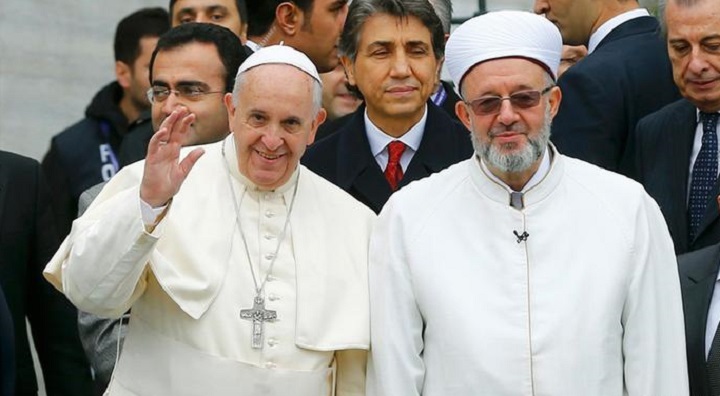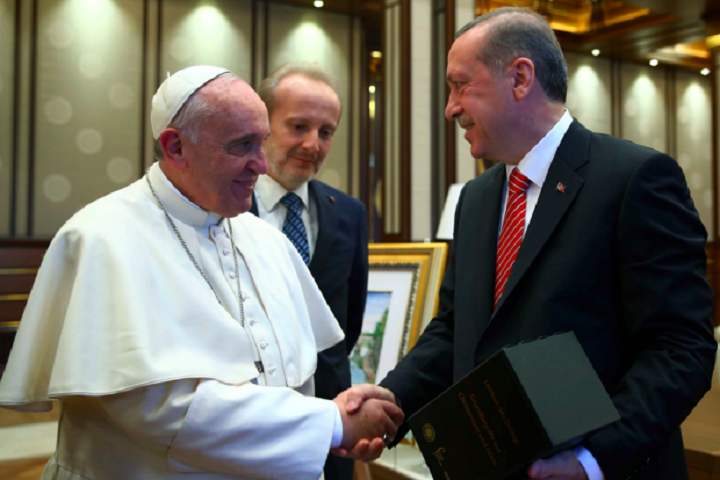
During a weekend trip to Turkey, Pope Francis spoke out against religious persecution, and encouraged dialogue and tolerance amongst religious leaders to counteract faith-based killings in the Middle East.
On Saturday, he spoke to a group of Muslim and Christian leaders who joined together with the Diyanet, the Department of Religious Affairs, in the Sunni Islamic authority in Turkey.
The pope conveyed his desire to see strong communication between religious leaders, and said that such talks are crucial in sending a clear message to religious communities - even amid obvious differences - that mutual respect can be cultivated.
"It is a tradition that popes, when they visit different countries as part of their mission, meet also with the leaders and members of various religions," he said. "Without this openness to encounter and dialogue, a papal visit would not fully correspond to its purposes."

Over the course of his three day visit, he spoke out against religious persecution - specifically crimes against Christians and Yazidis. Prior to his trip, Vatican officials had said that he 'would not shy away from denouncing violence in God's name and voicing concern for Christians being targeted by the extremists.'
Over the past decade, Christians have been forced to flee Iraq and Syria due to the rise of al Qaeda, and now face further terror at the hands of ISIS militants. They uprooted and left behind their homes and earthly possessions in an effort to preserve their lives and their faith.
"This violence has also brought damage to sacred buildings, monuments, religious symbols and cultural patrimony, as if trying to erase every trace, every memory of the other," the pope said.
While small pockets of Christians chose to either pay the terrorists a protection tax or trust fully in God's omnipotent ability to care for them, many people - especially from Syria -fled to their neighbor in the north.
"Turkey, which has generously welcomed a great number of refugees, is directly affected by this tragic situation on its borders," Pope Francis said. "The international community has the moral obligation to assist Turkey in taking care of these refugees."
The pope denounced any violation against human life, which he called a gift of the God the creator, and reaffirmed that no persecutory killing can be justified by one's religion.
"The world expects those who claim to adore God to be men and women of peace who are capable of living as brothers and sisters, regardless of ethnic, religious, cultural or ideological differences."

During his trip, Pope Francis also spent time with Patriarch Bartholomew I, the spiritual leader of the world's nearly 300 million Orthodox Christians.
On Saturday morning, the two met in Istanbul to reaffirm a joint declaration they originally signed in May to promote the full unity of all Christians - especially Catholic and Orthodox believers.
"We express our common concern for the current situation in Iraq, Syria and the whole Middle East. We are united in the desire for peace and stability and in the will to promote the resolution of conflicts through dialogue and reconciliation," the declaration states.
Both men also communicated the need to ensure that Christians in the Middle East are not forced to leave a land they have called home for more than 2,000 years. They expressed their fear over the disregard for human life, and looked to God's words in I Corinthians 12:26 for guidance.
"And whether one member suffer, all the members suffer with it; or one member be honoured, all the members rejoice with it."
They also sought support from religious groups worldwide.
"The terrible situation of Christians and all those who are suffering in the Middle East calls not only for our constant prayer, but also for an appropriate response on the part of the international community," the joint declaration read.

Pope Francis also spoke with Turkish president Recep Tayyip Erdogan, the leader of the largely Muslim country, who warned that Islamophobia is on the rise throughout the world.
But the rise of ISIS has created a real fear around the globe. As CNN recently reported, ISIS currently controls hundreds of square miles, ignores international borders and has a presence from Syria's Mediterranean coast to south of Baghdad - it rules by Sharia law.
Erdogan's concerns are not without cause - public executions, mass murders and beheadings certainly haven't quelled an alleged increase of Islamophobia.
But Pope Francis still expressed his concern over ongoing violence in the region.
"Sadly, to date, we are still witnessing grave conflicts. In Syria and Iraq, particularly, terrorist violence shows no signs of abating," the pope said after talks with Mr. Erdogan. "Inter-religious and inter-cultural dialogue can make an important contribution ... so that there will be an end to all forms of fundamentalism and terrorism."
At the Holy Spirit Catholic Church in Istanbul, Pope Francis talked with refugees from Syria, Iraq and Africa to encourage and express his deep concern for their plight.
"I wish to assure you that I share your sufferings," the pope said. "I hope my visit, by the grace of God, may offer you some consolation in your difficult situation."
The Turkish government is currently housing more than 1.6 million refugees from Syria, and nearly 50,000 Yazidis from Iraq, due to the rise of ISIS in recent months, The New York Times reported.The Turkish president Recep Tayyip Erdogan, who welcomed the pope as the first foreign dignitary to his new presidential palace outside Ankara, for his part issued a strong warning about rising Islamophobia in the world.
The visit of the pope is seen as a crucial test of Francis's ability to build bridges between faiths amid the rampage by ISIL extremists in Iraq and Syria and concerns over the persecution of Christian minorities in the Middle East.
"Sadly, to date, we are still witnessing grave conflicts. In Syria and Iraq, particularly, terrorist violence shows no signs of abating," the pope said after talks with Mr Erdogan.
"Inter-religious and inter-cultural dialogue can make an important contribution ... so that there will be an end to all forms of fundamentalism and terrorism," the leader of the world's Roman Catholics added.
The pope also said all faiths should share the same rights.
"It is essential that all citizens - Muslim, Jewish and Christian - both in the provision and practice of the law, enjoy the same rights and respect the same duties."
Turkey's Christian community is only 80,000 in a country of 75 million Muslims but consists of Armenians, Greek Orthodox, Franco-Levantines, Syriac Orthodox and Chaldeans.














